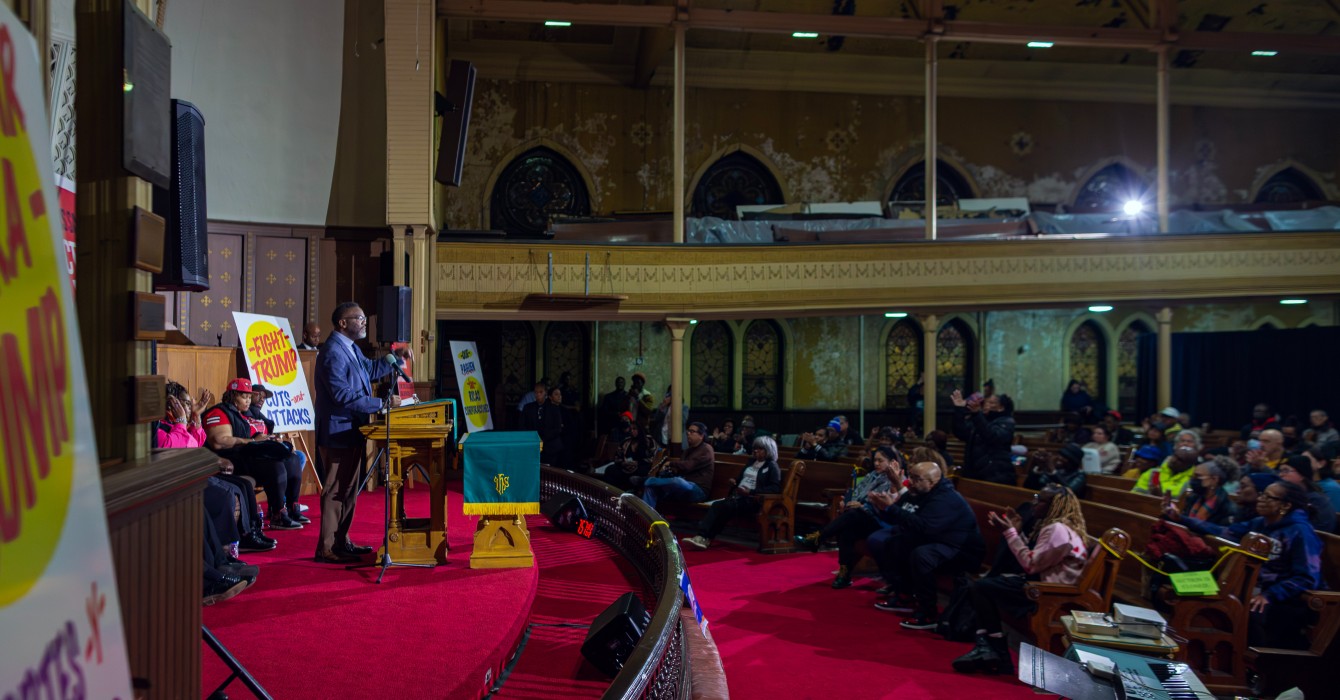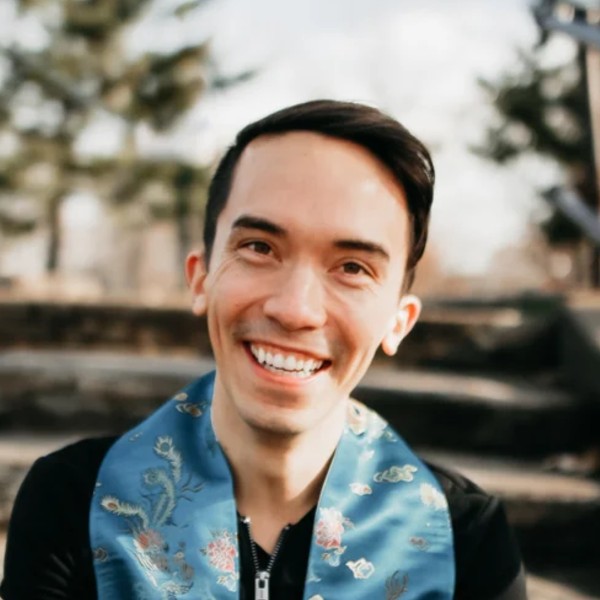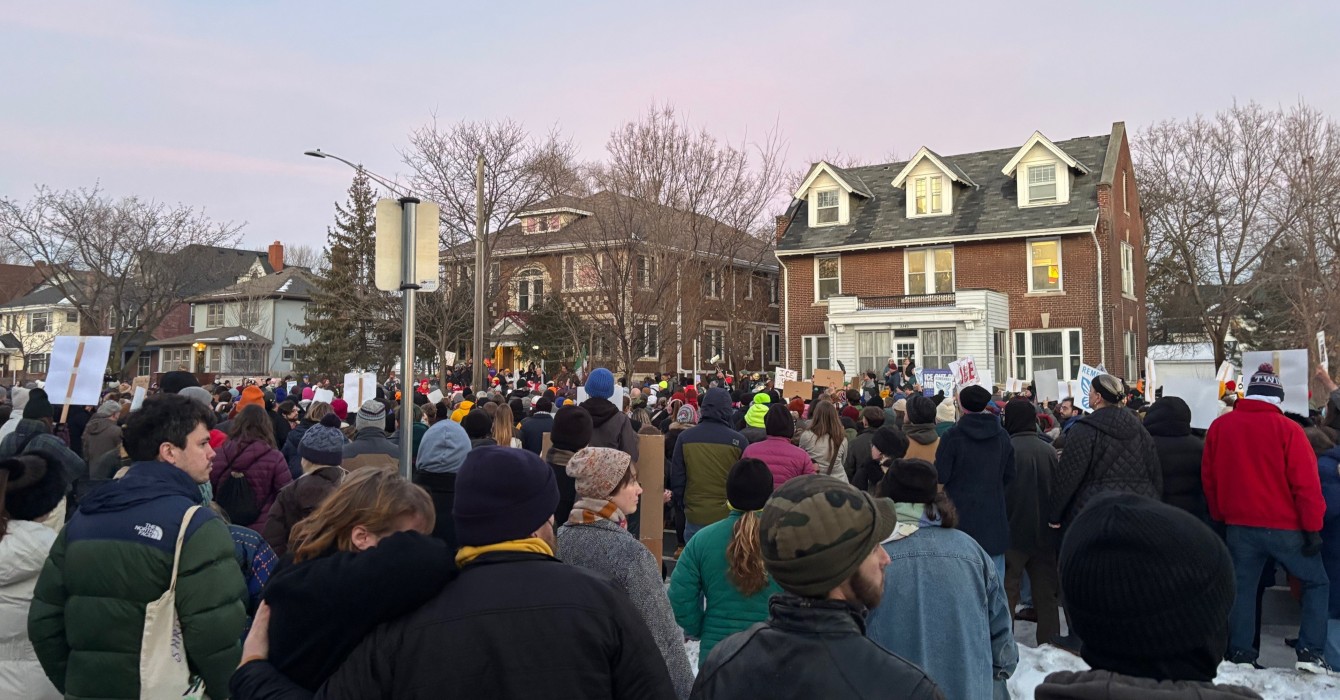On the afternoon of May 10, 2014, Sacramento police responded to a deadly shooting in Peregrine Park and called for an unusual type of backup -- from a local pastor.
Officers were trying to calm an agitated crowd, including family members of 29-year-old Jacoby James, who had been shot dead during a child’s birthday party in a gang-related attack. They were angry at police for leaving his body uncovered for hours in the sun behind a strip of police tape.
When the Rev. Anthony Sadler of Shiloh Baptist Church arrived, he tried to calm the onlookers by leading them in prayer. Then he explained: the police intended no disrespect; they simply couldn’t cover James’ body, because all evidence, including possible DNA on his clothing, wasn’t yet collected from the crime scene.
Clergy “are able to explain it in a way that only a pastor can,” said Lt. Roman Murrietta, the coordinator of Cops & Clergy, a two-year-old partnership between the Sacramento Police Department and about 20 local pastors. “It diffuses the entire situation.”
The Peregrine Park episode is an example of faith leaders helping to ease law enforcement tensions, which have spiked around the country in the wake of police shooting deaths and massive protests in Ferguson, Missouri, New York City and Baltimore. Yet it’s also part of a broader phenomenon: congregations aligning with public institutions to help serve the common good.
From police departments to public schools, congregations are finding new partners, and new mission outreach opportunities, as they team up to help the public sector be more effective. They’re filling gaps and using a personal touch to prepare people, including at-risk kids, teens and adults, for productive relationships with institutions.
“Churches are very consciously looking at the work of the state and trying to align their ministries to best serve people,” said Arthur Farnsley, the associate director of the Center for the Study of Religion and American Culture at Indiana University-Purdue University Indianapolis. “As health care changes, and as public education has changed, maybe it is the case that churches are aligning their missions to maximize their benefit.”
American society relies on public institutions to deliver a range of basic human services, Farnsley said, but those institutions don’t always have the resources, trust or neighborhood ties that lead to success. They often struggle to connect with wary segments of their clientele -- undocumented immigrants, gang members, the mentally ill, millennials who view institutions with suspicion.
That’s where parish networks come in. They’re leveraging social capital and volunteer power in ways that complement the work of public institutions.
Churches are “looking at these government programs and deciding that the need is for a buffer layer between government and individuals at specific points,” Farnsley said.
What ministries might appropriately support the work of public institutions?
Approaches vary widely, and the partnerships come with risks as well as opportunities. But some faith leaders are finding the territory rewarding.
Risks and rewards
In Sacramento, partnering involves pastors and police working side by side, and not just when an incident calls for a pastor’s touch. Officers take clergy on weekly visits to schools, jails and homes, where they make introductions to young men who have been arrested or have felt pressure to join gangs. The hope is that pastors can build up trust among those at risk of becoming offenders and steer them away from gang life and crime.
Sadler, of Shiloh Baptist Church, has seen lives changed through these interventions. One officer introduced him to a teenager who had been arrested on drug charges and beaten up. When they met, the young man was thinking about joining a gang for protection. The pastor began paying him modest sums to do odd jobs around the church once a week on his way home from school. Sadler became a mentor to him, and the teen hardly ever missed a Sunday worship service. Having developed new friends and new focus, he’s now off probation and doing well in trade school.
“We’re partnering with [police] because we have the same objective: we’re tired of seeing our young people die prematurely due to violence,” Sadler said. “We’re tired of doing too many young people’s funerals and ministering to their families, including their mothers and grandmothers, after their child is gone. I’ve done far too many of those.”
Pastors in the Cops & Clergy program go through the Sacramento PD’s Ministers Academy, where they learn enough about law enforcement techniques to discuss them as de facto ambassadors of the police department in their respective neighborhoods. Pastors invite officers to church events, where locals get to know them as individuals and sometimes pray for their families and their police work.
This coziness with law enforcement comes with trade-offs. When demonstrators rallied against police violence and blocked traffic earlier this year, Sadler arrived on scene with other pastors and officers. But the protestors wouldn’t talk to the clergy, he said, because they were “associating us with law enforcement.”
“It’s a tightrope that we kind of walk, because we don’t want to lose our credibility with the community, but at the same time we need to be agents of change,” Sadler said. “We need to have influence.”
In Boston, working with police involves a different set of dynamics for faith leaders. In predominantly African-American neighborhoods such as Roxbury and Dorchester, pastors aren’t as closely aligned with police as their counterparts are in Sacramento.
Yet Boston clergy nonetheless have productive partnerships with police through the Boston TenPoint Coalition, which has paired faith leaders with public agencies to work on youth issues, including violence, since 1992. These relationships draw on pastors’ clout as community advocates who aren’t known for coziness with police.
When threats of violence run high in the summer heat or after controversial incidents, Boston congregations host public meetings where police and residents discuss problems and concerns.
Early this spring, Twelfth Baptist Church in Roxbury hosted a public meeting in a tense time after Boston police killed an African-American man. Prior to the meeting, police let pastors see a video of the incident, in which an officer was shot in the face, leaving him critically injured. When the community gathered to hear details, police were present, but pastors did the talking. They explained what the suspect had done to provoke the police response.
“We just told them that he got out of the car shooting and police shot back,” said the Rev. Miniard Culpepper Jr., the pastor of Pleasant Hill Baptist Church in Dorchester. “That served to neutralize a lot of the skepticism.”
Just as congregations help ease community tensions with police, so also officers help buttress community efforts of congregations to make parks crime-free and keep youth out of trouble. Pleasant Hill Baptist hosts its Trotter Park Peace Program from 5 to 9 p.m. on summer evenings at the church’s neighboring park, which at times has been a hotspot for crime. Activities are meant to get hot summer nights off to a peaceful start, Culpepper said.
For security at the peace program, the church hires members of a local gang in a bid to cultivate in them a sense of purpose and responsibility. Police make it possible by patrolling the park perimeter, in part to make sure rival gangs don’t clash.
It’s a partnership, but one that depends on the church’s relative independence from police and its clout as a trusted voice in the kids’ corner, willing to stand up to police when necessary.
“We have pretty tough conversations [with police] sometimes about the treatment of the young folks,” Culpepper said. “The young folks know we serve as advocates for them.”
Gospel commitment
Roxbury Presbyterian Church is pioneering a new forum that meets another important community need, according to the Boston Public Health Commission. Last fall, the church launched “Can We Talk?” as a venue to support healing among trauma victims. It’s a joint venture with other faith-based and secular organizations that serve as commission partners.
Whether attendees have lost a son in a gunfight or struggle with battle scars of their own, the relaxed setting with food and music gets them talking. More than 100 people show up every month. Some bare their souls at an open mic, some just listen, and some get help from professionals on-site. The hope is that they’ll find healing before past trauma gives rise to addictions, violence or other problem situations for the community.
 “With this [trauma program], we work with the police department, the hospitals and the schools,” said the Rev. Liz Walker, the senior pastor of Roxbury Presbyterian Church. “This is a neighborhood where you have a lot of trauma because of violence, unemployment and all kinds of reasons why people are feeling disconnected. [The monthly forum] is a soft entry into mental health services.”
“With this [trauma program], we work with the police department, the hospitals and the schools,” said the Rev. Liz Walker, the senior pastor of Roxbury Presbyterian Church. “This is a neighborhood where you have a lot of trauma because of violence, unemployment and all kinds of reasons why people are feeling disconnected. [The monthly forum] is a soft entry into mental health services.”
When you partner with another institution, what guidelines do you follow?
In working with public institutions, faith leaders find that they’re able to put some of their deepest-held values into action, as long as they heed essential guidelines. Those working with public schools have found the formula to be relatively straightforward. In a nutshell: don’t proselytize, and don’t bring an agenda; let administrators explain their needs, and offer to help accordingly.
Example: the Micah Association, a parish network to support public education in Richmond, Virginia, connects local schools with as many as 1,800 volunteers from 130 congregations. Participants agree not to pray with children at school or seek to make converts to Christianity. As long as they pass background checks and follow the rules, they’re free to live out their faith in settings where they’re needed, in tutoring, administrative support or other areas.
“Public school is the only institution in society that has to take everybody,” said the Rev. Ben Campbell, a priest in the Episcopal Diocese of Richmond and a co-founder of the Micah Association. “That’s a gospel commitment. That is Jesus’ commitment. In that sense, public education is a genuine expression of gospel commitment. Churches understand that, but most other people don’t.”
Expanding reach through networks
While individual congregations have long had ties to one or two neighborhood schools, today’s trend is toward networks of multiple parishes collaborating to meet school needs in a district or city. They’re collaborating to build trust with administrators, who determine which organizations and volunteers get access. They’re also sharing insights and honing skills that make them valuable to individual schools.
Elementary-level reading skills, for instance, require one-on-one teaching to develop. But teachers increasingly can’t devote that kind of attention to every student, especially when they have 30 or more in a classroom.

Photo courtesy of Roxbury Presbyterian Church
That explains why some 250 schools in three states now rely on volunteer literacy tutors with training from the Augustine Literacy Project, a network based at Church of the Holy Family in Chapel Hill, North Carolina. Eleven of its 14 chapters are church-based. All train their tutors in the widely accepted Orton-Gillingham method, which Holy Family started using in 1994.
“Other churches asked if they could basically copy or replicate our model, which we thought was a grand idea,” said Augustine Literacy Project Executive Director Debbie McCarthy. This was the beginning of the network that now guides congregations and volunteers in how to partner effectively.

he built. Hykes' congregation, Church of the Holy
Comforter in Burlington, North Carolina, is part
of a parish network that supports schools.
Photo courtesy of Beth Glidewell
Augustine Literacy Project tutors meet a basic need for a targeted cohort: low-income children who are reading below grade level. It’s a task that technically falls under the purview of the public school system, but it’s also one that realistically won’t be met -- at least for the most disadvantaged or slow-learning children -- unless the church or someone else mobilizes teams of volunteers to act.
“It’s strictly a secular literacy curriculum, but we do it -- or I know I do it -- because I do feel it’s answering the call that Jesus asks of us to serve the least of these,” McCarthy said. “Without this intervention, many of them end up feeling so frustrated and humiliated that they drop out of school and end up in the criminal justice system.”
Partnerships are weaving congregations into the fabric of life at individual public schools. Blackstone Innovation School in Boston, for instance, counts the blessings it’s received from the 55 area congregations that partner with St. Stephen’s Episcopal Church, including after-school tutoring, a summer program at the church, donation of a 10,000-volume library at the school and volunteer librarians.
As experimentation continues, so also does the exploration of potential new partnerships. Los Angeles is considering a program based on Sacramento’s Cops & Clergy, which was prominently featured at the annual L.A. Gang Violence Prevention & Intervention Conference in May. California pastors in the cities of Seaside and Oxnard are exploring the same for their communities. On the school front, the Augustine Literacy Project has recently expanded to South Carolina and Texas and is soon to launch chapters in Tennessee and Georgia.
“Partnering with the state is not without some risk,” Farnsley said, adding that critics are apt to say the church’s mission has been co-opted by the state. But he says churches are likely evolving to embrace a new role as liaison between big, public institutions and individuals who need services.
“That the church would find some of its ministry to people is in trying to humanize those interactions -- that makes real good sense to me,” he said.
Questions to consider
Questions to consider
- Which public institutions could your congregation or Christian organization partner with in order to more fully “serve the common good”?
- Does it make sense for your organization to align its ministries with the work of the state?
- What government functions could the church provide a "soft entry" into?
- What resources or forms of capital do you have in abundance? Which public institution in your ecology or neighborhood has a scarcity or need that you know of?
- What are the boundaries you might need to heed or the risks you might encounter in developing the kinds of partnerships the story describes?
- Could your existing ministries be expanded through a network with other organizations?














